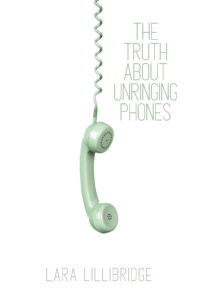 Review by Celia Jeffries
Review by Celia Jeffries
The phone that doesn’t ring in this memoir is the one that should be connecting Lara Lillibridge to her father. The father who moved to Alaska when she was four, forcing her to chase after him, “flying a quarter of the way around the world to tug at the hem of his jacket, beg him to look at me.” (13)
Subtitled “Essays on Yearning”, Lillibridge explores the edges of responsibility and self-preservation in a mosaic pattern, adjoining long-form essays with searing vignettes from the life she lived in response to his abandonment, intersecting poetry, braided essays, and infographics. The book opens with a chart of “The Many Wives of Clinton Lillibridge” (15) that outlines the spider-like turns of her father’s affections, dropping one family to focus his attention on the next, leaving his first-born daughter to struggle for attention, until she finally turns away from the pain. “I picture myself made of bronze. My cheek cold, my ears sealed shut. I wish and hope to be that taciturn and strong, but I am made of flesh and my heart still beats for him, though I tell myself over and over not to give in.” (39)
At the heart of this memoir is the eternal question what makes a family? Lillibridge stays connected to her siblings (including her half-sister who she identifies as her sister) but finds it nearly impossible to connect with the growing number of siblings created by her father’s multiple marriages. When her sister’s son dies and her father takes her aside at the funeral to apologize for the years of his neglect, she speaks directly to the reader. “I’d like to give you the dialog, but my anger acted as the flash bulb in an overexposed photograph, blurring details, leaving only his intention at the center, the rest out of focus. . .my father’s words didn’t undo forty years of inaction, but I said something soothing. That is what you do at funerals.” (53)
It was not all pain. In “The Boat Was Always the Best Part of My Father” Lillibridge looks back at the childhood summers she spent with her father in Alaska, and acknowledges “I was never braver than when I was in Alaska, under my father’s gaze.” (212) in “Fragment of a Song” she realizes “But maybe seeing my father more would have been worse, not better. Maybe the only thing that saved me after all was the distance between us.” (157)
In the braided essay “Field Notes on Damage” she uses the metaphor of a mollusk that creates a pearl, layers of calcium carbonate “formed in part of the mollusk’s immune system to protect the mollusk form parasites, damage, or an intrusion of organic materials” (166) as a way to explore the year she moved to Alaska as a teenager to live with her father and made a half-hearted attempt at cutting herself. “I knew slicing my wrists was overly dramatic. . .And my mother, I couldn’t do that to my mother. ” (166) “The physical pain overrode the emotional pain.” (166)
Years of seesawing emotions followed until motherhood brought things into direct focus “I could not let my father wound my kids the same way he wounded me.” (181) Lillibridge moves in and out of her family relations with lists of things she sends her father during covid, lists of things she doesn’t send him during covid “Photos of me/A personal letter/My voice over the telephone” (207) and short fragments as her father begins to decline into dementia. Eventually, when his current wife dies, she finds herself managing his care along with two of her stepsisters and is surprised by the turn of events. “Dementia has stripped away everything he used to be, leaving only an old man waiting to die. They bring him dinner, send me pictures. For the first time, we feel like family.” (222)
Lillibridge doesn’t turn away from the pain in her life, neither does she allow herself to be consumed by it. “The Truth About Unringing Phones” is an intrepid journey into the complexity of family.
The Truth About Unringing Phones, a memoir, by Lara Lillibridge
Unsolicited Press, 2024, $17 paperback
ISBN 9781956692778
Celia Jeffries is a writer, editor, and teacher whose work has appeared in numerous newspapers and literary magazines including Puerto del Sol, Writer’s Chronicle, and SolsticeLitMag. BLUE DESERT, her first novel, is available in print and audio.
